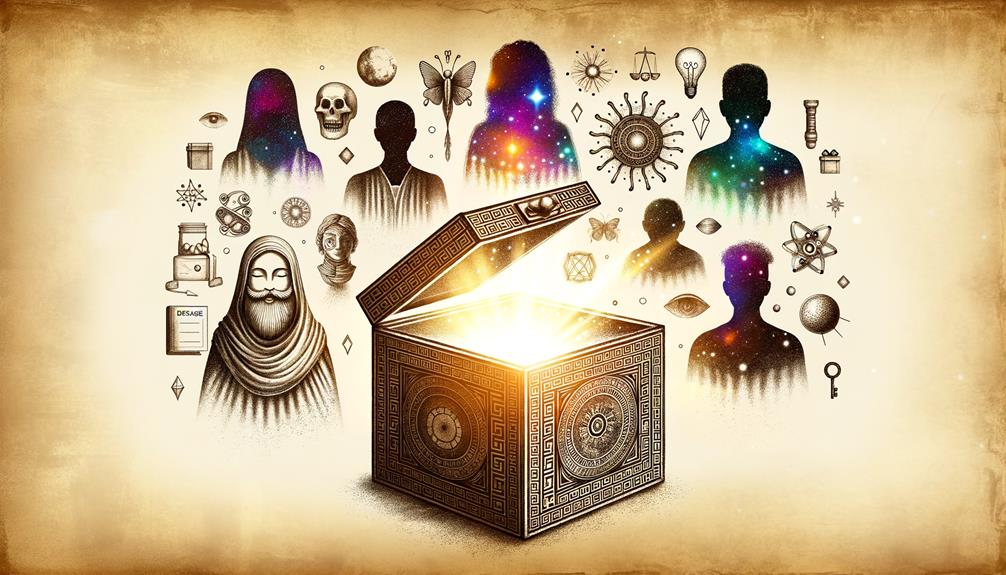You know, the tale of Pandora's Box, buried deep in Greek mythos, is a powerful symbol of unquenchable curiosity, the fallout from it, and the strength of hope. Let's talk about Pandora, who was the first woman. Hephaestus, a god, shaped her from the earth and the other deities endowed her with fascinating traits, among them a curiosity that knew no bounds. This led to her opening a box which held all the evils known to humankind.
Now, these evils symbolized the darker side of human nature, and Pandora's act of defiance set them loose in our world. It's a stark reminder of what can happen when desires go unchecked. But let's not forget that at the heart of this story, hope was still there, tucked away amidst all that negativity in the box. This serves as a symbol of our ability to bounce back from tough times.
So, this age-old tale, brimming with symbolic meanings and life lessons, is worth delving into. It's like peeling back the layers of an onion, where each layer reveals more about our society and the many ways this story has been interpreted and retold over time.
Unraveling Pandoras Myth
Let's take a look at the fascinating tale of Pandora, the first woman in Greek mythology, from Hesiod's 'Works and Days'. Pandora was painstakingly shaped by Hephaestus from earth, and various gods blessed her with captivating qualities. We get a deeper insight into the myth of Pandora's box from this creation narrative, which is ripe with symbolism.
Interesting fact: despite what many people think, Pandora's box was actually a jar, filled to the brim with all the negative aspects of humanity. Pandora's natural curiosity and the resulting disobedience led to these negatives being set loose in the world. The story serves as a warning about the severe repercussions of curiosity left unchecked. However, it also points out that hope, which remained in the jar, is a comforting presence in times of difficulty. Thus, Pandora's story skillfully navigates elements of human frailty and the fine line between curiosity and its outcomes.
Pandora: A Closer Look
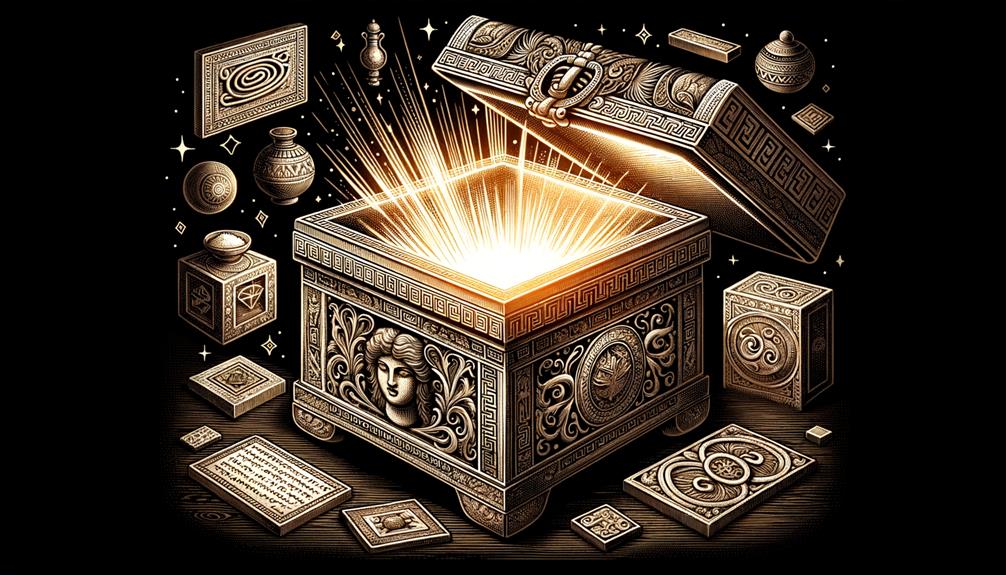
Let's have a friendly chat about Pandora, the first mortal woman in Greek mythology. Her story signifies a crucial turning point in human history.
- The birth of Pandora was no ordinary event. She was a divine creation, sculpted from clay to become the first human woman in Greek myth.
- Pandora was not only a beautiful creation but was gifted with irresistible charm by the gods, showing the Greek's deep admiration for beauty and magnetism.
- Pandora's tale has a darker side, though. She was actually Zeus's way of getting back at Epimetheus, which gives us a glimpse into the Greeks' views on divine punishment.
- Pandora's story emphasizes elements like femininity, curiosity, and divine punishment, serving as a stark reminder of the potential dangers of curiosity without bounds.
Decoding the Boxs Symbolism
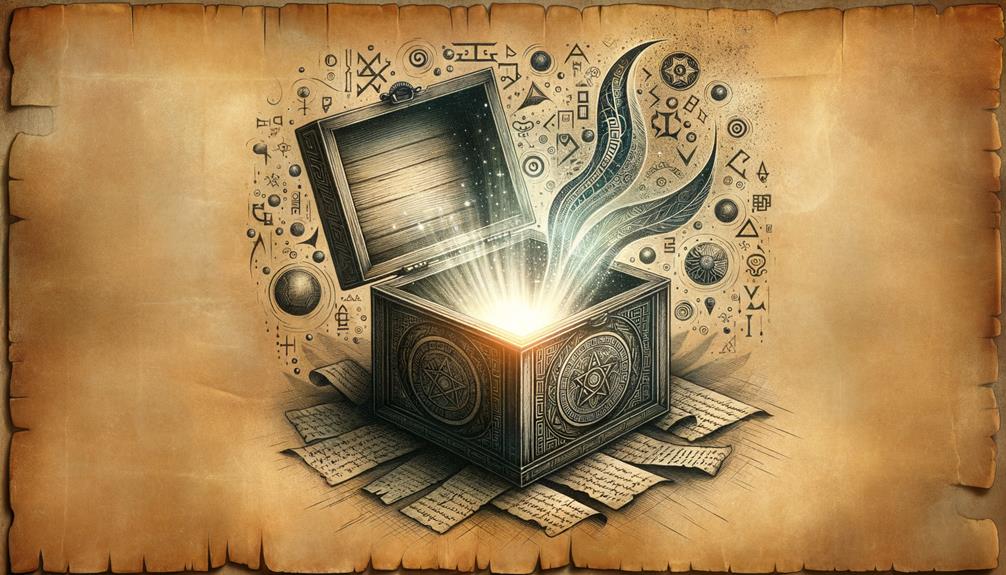
When we look at Pandora's box and what it signifies, we see that it's not a one-size-fits-all sort of symbol. Its significance is all tangled up with what it means to be human. Let's try to understand what it's trying to tell us about curiosity, the repercussions of our actions, and the place hope holds in our lives. The idea is to dig deeper into these symbols to get a better grasp on the complexities of our existence.
Symbolic Interpretations Explored
Delving into the symbolism of Pandora's box, it's clear that the box itself serves as a powerful metaphor for the potential fallout of reckless curiosity and disobedience. The moment Pandora, can't resist her curiosity and opens the box, she lets loose evils like sorrow, disease, and vice in the world.
But the box isn't just a bringer of evil. It also holds:
- A stark reminder of the perils of uncontrolled curiosity
- The moral principle of exercising self-restraint
- The release of hope: a symbol of optimism in the face of adversity
- A narrative that skillfully weaves between curiosity, consequences, and hope
Unraveling Mythical Symbolism
Right, let's chat about Pandora's box, or rather, jar – a pithos, to be exact. In the Pandora myth, this object is jam-packed with symbolic meaning. When Pandora, driven by her curiosity, opened it up, she unleashed all kinds of troubles upon the world. It's kind of like a warning from the ancient Greeks: be careful, because too much curiosity can get you into a whole heap of trouble. And boy, did it ever. Sorrow, disease, and even death spread everywhere.
But it's not all doom and gloom. Amongst all the nasty stuff, there was also hope trapped in that jar. It's a message from the myth-makers that no matter how bad things get, how dire the fallout from our choices, hope is always there. It's always something we can hold onto. So, in a nutshell, the Pandora myth is a deep dive into the human condition. It shows us the balance between curiosity, the fallout from our actions, and the persistence of hope.
The Seven Evils Unleashed
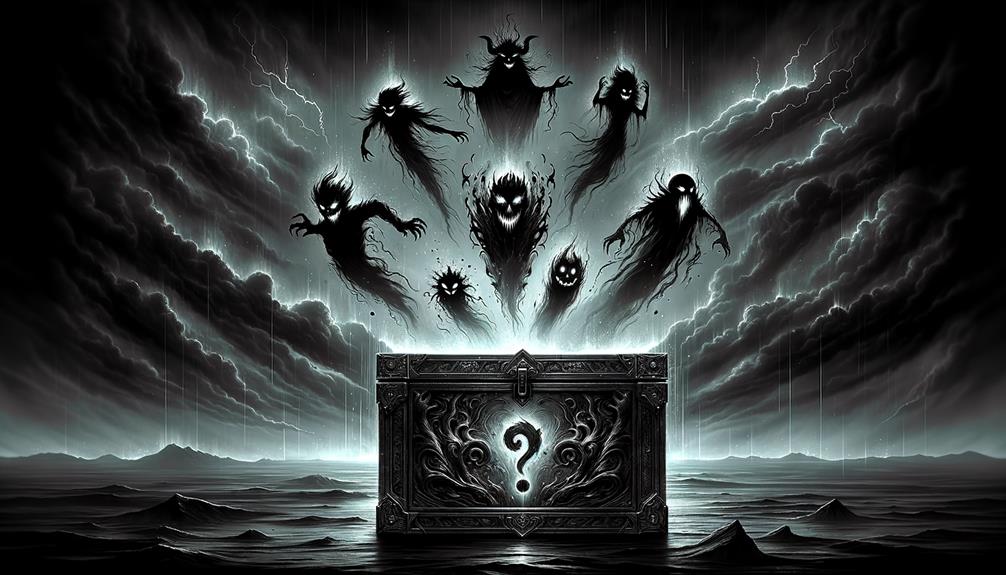
So, let's chat about the story of Pandora's Box and what it let loose in the world: wrath, gluttony, greed, envy, sloth, pride, and lust. You might recognize these as the seven deadly sins in Christian belief. Pandora, driven by disobedience and a dash of curiosity, unleashed these sins. As we sift through the fallout of Pandora's actions and brainstorm how to lessen the impact of these loosed sins, we get a clearer picture of the fine line between curiosity, its unavoidable fallout, and that persistent little spark of hope that keeps shining.
Understanding the Seven Evils
Let's talk about the seven evils – wrath, gluttony, greed, envy, sloth, pride, and lust. These aren't just old-timey sins; they're a deep dive into the intricacies of human nature and the fallout of uncontrolled desires. Think of Pandora's box. Once she lifted the lid, all these evils sprang out, casting a harsh light on our moral weaknesses and putting our ethical direction to the test.
Now, let's break down these seven evils:
- Wrath: This isn't just anger. It's a powerful rage that can cause ruin.
- Gluttony: This is about going overboard, especially when it comes to food and drink.
- Greed: This is about never being satisfied, always wanting more wealth or gains.
- Envy: This is about wanting what others have.
Each evil has its own weight, acting like a reflection of our flaws. The fallout of these uncontrolled desires can be destructive, reminding us of our human failings.
Implications of Pandoras Actions
Pandora's actions unleashed a wave of moral decay and societal damage, shedding light on the destructive aftermath of uncontrolled human wants and deeds. The seven evils that emerged from Pandora's box are symbolic of human shortcomings, with each one representing a distinct aspect of our moral degradation. This story acts as a warning sign, drawing attention to the possible repercussions of succumbing to curiosity and rebellion.
| Evil | What it Symbolizes | Result |
|---|---|---|
| Wrath | Unrestrained fury | Aggression |
| Gluttony | Excessive consumption | Squandering |
| Greed | Overwhelming lust | Disparity |
| Envy | Desiring others' achievements | Dissatisfaction |
| Sloth | Lethargy | Stagnation |
These evils, their meanings, and outcomes depict the various damage caused by Pandora's reckless action. The story of Pandora's box is a classic cautionary tale that emphasizes the dangers of unregulated desires and actions.
Mitigating the Released Evils
Pandora's actions might have unleashed seven evils, but it's crucial to see the glass half full here. Think of Pandora's box as not just a warning sign of curiosity gone awry, but also a helpful guide to self-discipline and toughness.
So, how exactly do we lessen the impact of these evils? Here are some thoughts:
- Tackling wrath? Let's nurture a sense of empathy and patience.
- Going up against gluttony and greed? Fostering a sense of moderation and satisfaction could be the key.
- How about envy and pride? Bolstering self-worth and gratitude might be the way to go.
- And as for sloth and lust? Stimulating diligence and fervour could do the trick.
Keeping the language straightforward, this is our way of pushing back against the seven evils. Remember, it's not just about telling you these things are 'important,' it's about understanding why they're significant and how they can positively impact society.
Pandoras Impact in Literature
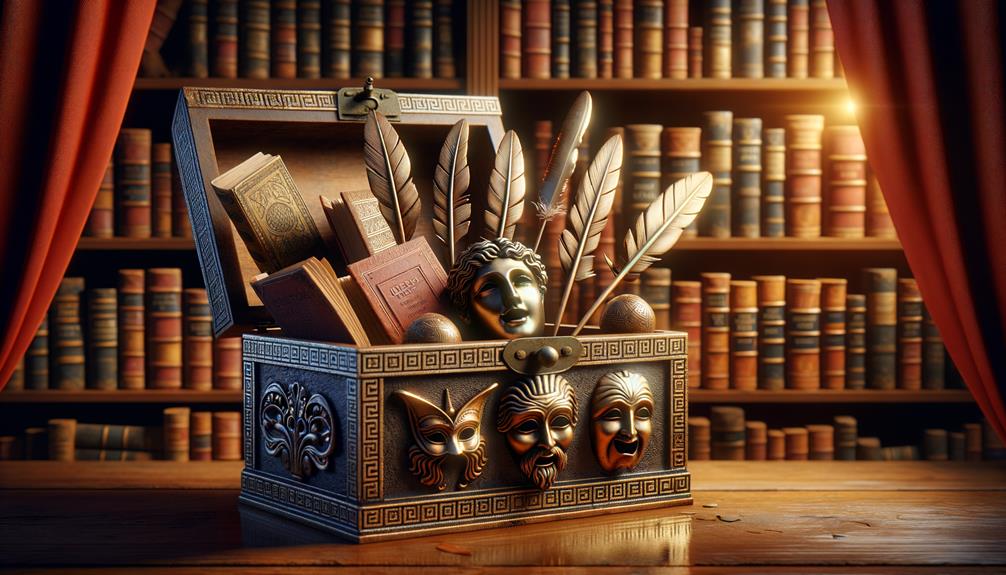
The story of Pandora has been a pretty hefty influence on literature, acting as a strong warning about the risks of being too curious or not following rules. This old Greek tale has been retold so many times, and with each retelling, it reflects changes in society and how gender roles are seen. Scholars like Jane Ellen Harrison and William E. Phipps have dug deep into the many interpretations of Pandora's story, which really shows just how much of an impact it has had. The tale gives us a lot to think about, especially when it comes to how women were seen in ancient Greek society. Pandora is often set side-by-side with Eve, which really highlights how significant her story has been for Western culture. Pandora's story keeps popping up in books, operas, and even paintings, and its themes are just as relevant and thought-provoking today as they were back then.
The Reality Behind the Myth
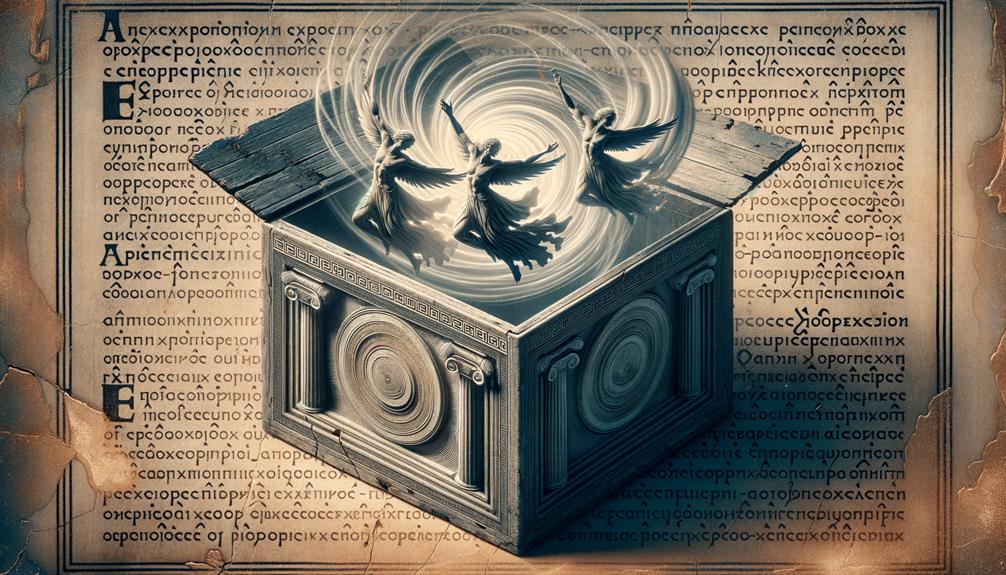
Contrary to popular belief, the infamous Pandora's Box isn't really a box at all but a jar. This originates from ancient Greek mythology, specifically Hesiod's 7th-century BC poems titled 'Works and Days.' If we dig into the Pandora's Box story, it's more than just a warning. It's filled with meaningful symbols that still hold significance today.
- The item often wrongly referred to as a box is actually a jar. This jar is a potent symbol, representing the power and potential Pandora possessed.
- Pandora's intense curiosity led to the release of all evils – a clear warning about the potential consequences of disobedience and curiosity gone unchecked.
- The so-called evils that escaped, including disease and violence, mirror the ongoing challenges we humans face every day.
- Hope, the sole entity left within the jar, serves as a symbol of our capability to remain hopeful and resilient, even when faced with tough times.
Frequently Asked Questions
What Are the 7 Evils of Pandora's Box?
So, you're curious about the infamous Pandora's box, eh? Well, let me break it down for you. It's a tale full of warning and wisdom. You see, Pandora's box unleashed seven pretty nasty things into the world – wrath, gluttony, greed, envy, sloth, pride, and lust. Now, these aren't just random evils. Oh no, they're symbolic. They represent the darker side of human behavior, the kind of stuff we all need to keep in check. The story serves as a clear warning about the dangers of letting your curiosity run wild and not following the rules. It's an old tale, but it still holds true today. I mean, who hasn't been tempted to open a box they were told not to, right?
What 7 Things Came Out of Pandora's Box?
You might find it interesting that Pandora's box, according to myth, was the source of seven destructive behaviors that plague humans: wrath, gluttony, greed, envy, sloth, pride, and lust. These are often related to the well-known concept of the seven deadly sins in Christian belief. They serve as a stark reminder of the potential harm that can ensue from unchecked negative behaviors.
What Is the Moral Behind Pandora's Box?
The story of Pandora's Box serves as a friendly reminder about the importance of self-restraint and being mindful of the repercussions of our actions. It cautions us about the risks of letting our curiosity run rampant, while also reassuring us about the incredible resilience of hope, even when faced with the potential harm that can come from defiance.
What Is the Story Telling About Pandoras Box?
Pandora's Box is a fascinating tale that serves as a cautionary reminder about the risks of uncontrolled curiosity. It's a story that drives home the value of self-restraint and moral character in our day-to-day lives.
The storyline underscores how our actions can have far-reaching consequences and why we should think before we act. The story also highlights the role of hope in our lives – as a powerful force that can help us navigate through the toughest of times. It's a timeless story that continues to resonate with us today because of its universal themes.
It's not just a story, but a life lesson packaged in an engaging narrative. It's all about understanding the power of hope and the importance of moral virtues in shaping our lives.

